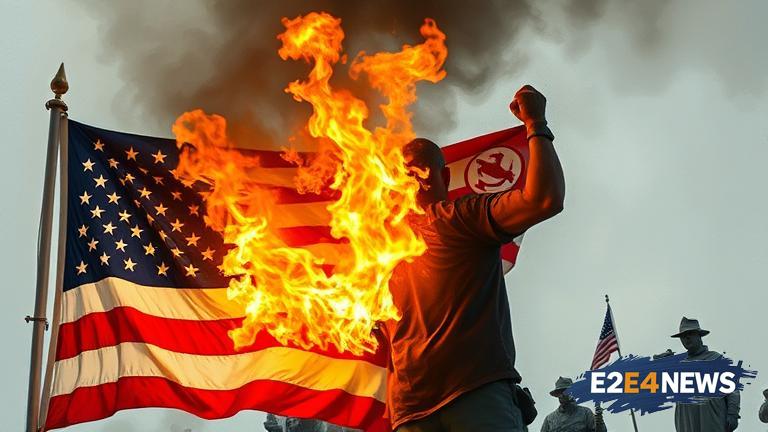In a shocking display of protest, Jay Carey, a veteran of the US military, has burned the American flag, sparking a heated debate across the nation. The incident has raised questions about the limits of free speech and the symbolism of the flag. Carey, who served in the military, expressed his deep-seated frustration with the current state of the country, citing issues such as corruption, inequality, and social injustice. He claimed that the flag, which is often seen as a symbol of freedom and patriotism, had become a representation of the very problems he was protesting against. The veteran’s actions have been met with widespread criticism, with many condemning his decision to desecrate the flag. However, others have come to his defense, arguing that his protest was a legitimate expression of his discontent with the government. The incident has also sparked a discussion about the First Amendment and the right to free speech, with some arguing that Carey’s actions were protected under the Constitution. Despite the controversy, Carey remains unapologetic, stating that he would do it again if it meant bringing attention to the issues he cares about. The veteran’s protest has also highlighted the growing divide within the country, with many feeling disillusioned with the current state of politics. As the debate rages on, it remains to be seen how the incident will impact the national conversation. The burning of the flag has also raised questions about the role of veterans in speaking out against the government, and whether their experiences and perspectives should be given more weight. Carey’s actions have been compared to those of other protesters who have used similar tactics to draw attention to their causes. However, the use of the flag as a symbol of protest has been particularly contentious, with many seeing it as a sacred symbol that should be treated with respect. The incident has also sparked a discussion about the history of flag burning as a form of protest, with some arguing that it is a long-standing tradition that dates back to the 1960s. Others have pointed out that the flag is often used as a symbol of patriotism and national pride, and that burning it is a rejection of those values. As the controversy continues to unfold, it is clear that the incident has tapped into a deeper sense of frustration and disillusionment within the country. The veteran’s protest has also highlighted the need for a more nuanced and respectful conversation about the issues that are dividing the nation. Ultimately, the incident has raised important questions about the nature of free speech, patriotism, and the role of protest in bringing about change. The use of the flag as a symbol of protest has also sparked a discussion about the power of symbolism in shaping public opinion and influencing political discourse. As the debate rages on, it is clear that the incident will have far-reaching implications for the national conversation. The veteran’s actions have also been seen as a call to action, with many urging others to speak out against the issues they care about. However, others have warned against the use of provocative tactics, arguing that they can be counterproductive and alienate potential allies. The incident has also raised questions about the role of social media in amplifying and shaping public discourse, with some arguing that it has created a culture of outrage and polarization. Despite the challenges, many are hopeful that the incident will spark a more nuanced and respectful conversation about the issues that are dividing the nation. The veteran’s protest has also highlighted the need for greater empathy and understanding between different perspectives, and the importance of finding common ground in order to bring about positive change.
